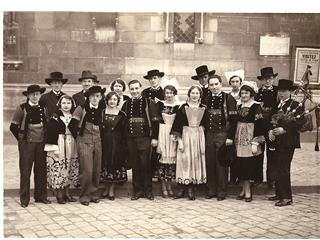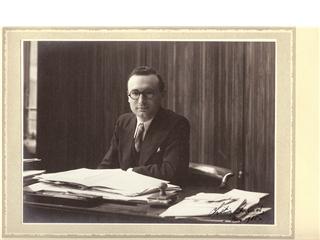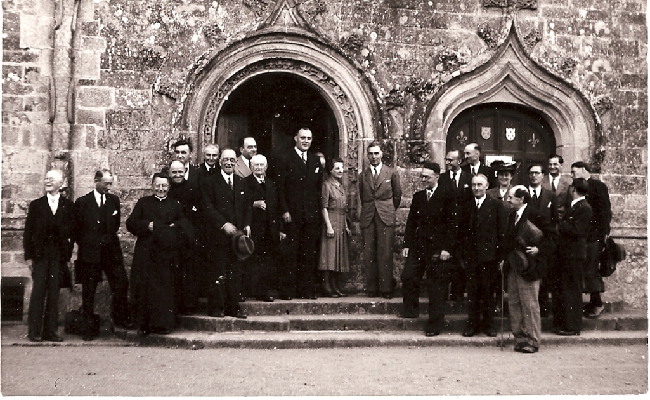Introduction by Yann Duchet (Originally in Breton and translated into French)
Deceased on 20th November 2011, aged 101, the old lion is now and for always in the Celts’ Paradise with the heroes of Brittany and Europe. May his world be pure!
With much emotion and respect, we had the privilege of celebrating his hundredth birthday in Quintin, in July 2010, where I saw this fighter and my ‘master’ for the last time, amidst flags of Brittany and Europe that he cared for so much…and that I care for so much!
Rhisiart Tal-e-bot , General Secretary of the Celtic League, wrote the following – “Faced with Yann Fouere’s vision, corresponding with the objectives of the twentieth century, the French State on the other hand maintained throughout his long life a vision worthy of the nineteenth century in respect of the Breton nation’s political, linguistic and human rights.” (L’Avenir de la Bretagne – Dazont Breizh no.498).
Yann Fouere, still writing some years ago, wrote in July 2005, “Never forget that we are and will always be the enemies of those in power and these never change except in appearance. They are not right wing or left wing and not even from the centre. Jacobins of all colours remain the enemy to bring down!”
In reality, beyond the eventualities linked with time and place, the ideals and actions of Yann Fouere have never changed. He always remained a patriot, and even a nationalist, in the depth of his heart and spirit, in spite of patience and calm in seeking effectiveness in the face of political realities of the moment or projects that had to be drawn up on a more or less long term basis. Consequently, the apparent evolution of his attitude and action in the course of time is, in the final analysis, the most efficient manner to attain the goal he has set himself, and that remains eternal – the sovereignty of Brittany in a federal Europe. The opposition and blind hostility of the French Republic, obtuse, recurrent and insolent in the face of the rights of nations, and all just and intelligent reforms, when it is the only one in Western Europe in this brutal refusal, have driven Yann Fouere to a more radical struggle at times. This was but the forced response from Emsav to the Jacobin dinosaur, which was important. The rest was just literature.
His love for the Breton nation and for European federalism was for Yann Fouere the bedrock as essential and vital to him as breathing. What matters in these circumstances is to survive and heal this totalitarian and imperialist sickness which is Jacobinism. That says it all!
A personality, therefore, and a destiny that in truth ought to designate him a superior person to the average mediocrity.
Since the founding of the P.O.B.L. and over many years, I had the opportunity of meeting with Yann Fouere as a ‘friend in the struggle’. Although he was born way back, what freshness there is in his fundamental beliefs, and what unshakable, unfailing and undeniable willpower in any situation, earning the admiration of the youth that we were then. The old lion always retained his steady reasoning, lively mind, experienced with an innate sense of the objective to be attained and the means to do so, without the pointless outer passion that frequently affects the fighters. On the contrary, perfectly au fait and with no illusions of the attitudes, expectations and capacities of others, or of the obstacles to be overcome, with no illusions but filled with an unshakeable hope, filled with clear sightedness and determination. This is the man with whom I had the honour and opportunity of working. How fortunate for me! My homage and thanks to him!
In spite of small minded characters, progressive troublemakers, and particularly those with forked tongues, Yann Fouere will always remain, throughout his life and struggle, a vigorous Breton with such a noble and gifted personality that he could have become a true Statesman. He had the makings of one and possessed the calibre for both a national and international career, and consequently could have defended and promoted the main Breton interests in a Europe under reconstruction if…if Jacobin France had been a democratic State like the other western countries, which it is not! In any case, the teachings of Yann Fouere, orientated towards the future of Brittany and Europe, remain more than ever important for the growing young generation.
Shortly before he died, I wrote to him as follows, “ Be assured of one thing that in spite of all the disillusionment and all the adversities you have been subjected to, the future generations of Breton patriots and European federalists, whatever their current allegiance , will not forget you and, more especially, will not remain unaware of your message and your example…ever since 1930 you have been part of all the battles for Brittany in Europe…You can be certain that your lesson will bear fruit…in its own time.
The following is an adaptation, not a direct or full translation, of the French version of Yann Fouéré’s biography.
Biography
In the history of the Breton movement, Yann Fouéré is one of the most prominent personalities of “Emsav” – the customary name for the Breton Movement as a whole – and has been in the front line of the Breton movement since before the Second World War through to the present day.
THE FORMATIVE YEARS
Yann – Jean on the social register – Fouéré was born in Gascony on the 26th July 1910. His father, Jean Fouéré, from a Breton farming family in the region of Dinan, was a senior civil servant of the State Revenue’s administration and spent most of his career outside of Brittany. His mother, of the Liegard family from the Trégor region, was clearly more socially privileged.
At an early stage of Yann Fouéré’s life, the family returned to Brittany. He spent most of his youth in Callac, close to a maternal great grandmother who was born in 1838 . He says that “It was most probably Callac that made the call of the old country irresistible later on”.
 1922 Yann Fouéré’s First Communion at Saint Charles
1922 Yann Fouéré’s First Communion at Saint Charles
The young Fouéré started his secondary education in St Brieuc where he was sent to stay with his maternal grandmother. However he soon rejoined his parents in Paris, his father being employed in the Ministry of Public Works under Yves Le Troquer from Guingamp. Yann continued his schooling at the Lycée Montaigne and at Louis Le Grand, but moved once again with his civil servant father to Clermont dans l’Oise where he did his baccalaureate in 1927.
1917 Yann Fouéré with the group Korollerien Breiz-Izel, back on the right. His father, Jean Fouéré, 3rd from the left at the back.
In the years following his baccalaureate, the young Fouéré discovers his passion for Brittany and Breton culture: He subscribes to Breiz Atao, the Breton nationalist movement’s publication, and immerses himself in the history of Brittany.
Returning to Paris to attend the Law Faculty and the Political Science School, Yann Fouéré mingles with the Breton militants of Paris. Subsequently, he is elected president of the Association of Breton Students in Paris (1933-37). He delivers a conference at the Celtic Congress in Dinard on ‘Les Saints Bretons et leur Oeuvre Nationale”, which is later published as a booklet. In 1934, having obtained his Degrees in Law, Arts and Political Science, he enters the Ministry of the Interior.
1934 Yann Fouéré at the Ministry of the Interior
At the age of 24, Yann Fouéré, henceforth autonomous, creates with Robert Audic, the Ar Brezhoneg er Skol association(ABES) which campaigns for the teaching of Breton in Brittany’s state schools. The majority of municipal councils – three hundred and forty six of them – and three general councils give their support to the ABES campaign.
Due to the success of this campaign, Yann Fouéré finds himself, in his own words, “bombarded”, into the position of vice-president for the Union Régionaliste Bretonne(1939-45). He becomes involved in the activities of the Union Fédérale for young people, the most powerful of the ex-servicemen’s organisations, recognised as belonging to the more left wing circles. As one of the U.F.’s youth group’s National Commissioners, Yann Fouéré as President of the International Commission takes part in numerous international gatherings from New York to Bucharest, which further exposes him to the problems of national minorities. He joins the Comité de Minorités Nationales, and soon after becomes the director and main contributor of “Peuples et Frontieres”, a publication for various autonomist parties.
Confronted with the mounting perils in Europe, Yann Fouéré refuses to subscribe to any ideologies “ whether right-wing or left-wing, whose concrete application always results in the the same thing for the people, with no progress for them” .
Towards the end of 1936, Yann Fouéré meets his future wife, Marie-Magdaleine Mauger, a young woman from the Trégor region who has come to Paris to seek employment like many of her compatriots. They are married at the beginning of the Second World War while Marie Magdaleine is a secretary at the Town Hall in the 6ème arrondissement.
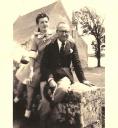 1942 Marie Madeleine and Yann Fouéré
1942 Marie Madeleine and Yann Fouéré
A good career at the Ministry of the Interior opens up before the young militant. He divides his time between numerous activities, those of Ar Brezhoneg Er Skol becoming the most prominent. The editing of “Peuples et Frontieres” leads him to the realisation that he has to create a more powerful regional newspaper to provoke a demand for the reestablishment of the province of Brittany, without offending a Breton population faithful to those in authority. Alas, the war was to thwart all these plans.
1940 -’45: FRENCH DIFFICULTIES, BRETON OPPORTUNITIES

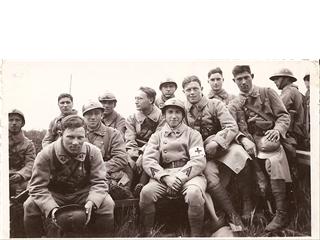
1932 – Yann Fouéré during Military Service in Compiègne, centre in profile.
Discharged from the army a few years before the conflict and safe in the knowledge that he is not liable to be recalled, Yann Fouéré takes advantage of his presence at the Ministry of the Interior to help the Basque nationalists in exile who had been pursued by pro-Franco troops south of the Pyrenees. Thus he becomes the official representative of the Ligue des Amis des Basques, making every effort to ease the life of the exiles on French soil. In particular, he enables the president in exile, Aguirre, to cross borders by obtaining passes for him
During the ensuing chaos of the German invasion in May-June 1940, Fouéré, a civil servant, has to follow the government, which eventually leads the newly-weds to Pau, a small town at the foot of the French Pyrenees. By the middle of August, impatient of the inactivity within a phantom ministry and drawn to take part in developments in Brittany, he is unable to carry on in Pau. He decides to leave Pau and return with his wife to Brittany. They settle in Rennes where he joins most of the personalities of Emsav who have already formed the coordinating bodies of the Breton nationalists: the Breton National Council and a secret grand council called the Kuzul Meur.
In that spring of 1940, there is much political activity in Brittany, but the German authorities have quickly realised the ease with which French soil is occupied and the feeble support given to the Breton nationalists by French public opinion. It is no longer necessary to favour Breton separatists by using them as a threat against the French nation. Henceforth they only tolerate Breton activities.
Yann Fouéré undertakes a reconnaissance journey. He draws up a “Projet de Statut” for Brittany and works towards creating a movement based on regional concerns, taking advantage of the political climate which could propel France in the direction of federalism, or at least towards a new regionalism. He is asked by Delaporte to become a member of a modified Kuzul Meur in order to coordinate their different roles: Fouéré the regionalist and Delaporte the separatist.
His position of civil servant on leave from the Ministry of the Interior draws the attention of the préfet for the Finisterre at the time, M.Georges, who offers him the post of sous-préfet for Morlaix. Rather than find himself obliged to take up a post in Vichy where the government is, the Breton militant accepts the post in Morlaix in October 1940.
At the same time he makes numerous contacts with a view to creating a newspaper that would advance a “provincialist” trend, directly in line with the project for the revival of the provinces as promised by Pétain. The margin for manoeuvre is a narrow one as neither Vichy nor the German authorities will tolerate a clearly “anti-French” project. Both Jacques Guillemot and Hervé Budes de Guébriant give their financial support for the future daily paper “La Bretagne”, with the latter arranging for the necessary authorisation from Vichy. Consequently,Yann Fouéré cannot avoid the intervention of the German press if he wishes to create his new newspaper.
Yann Fouéré’s days as acting sous-préfet quickly come to an end and the Ministry of the Interior summons him to Paris at the end of November. Soon afterwards, he makes a request for leave of absence which is ignored by the authorities. Finally, he decides to make the break: Yann Fouéré’s life is now devoted to the Breton cause and early in February 1941 he rejoins his wife in Rennes.
The newspaper “La Bretagne” is created there, in offices near the cathedral, and an agreement is reached for the printing of it with another daily paper, “Ouest Éclair”. On Thursday 20th March, the first issue of “La Bretagne” goes on sale. It is publicised as “a daily paper safeguarding Breton interests” for a “prosperous and happy Breton province in a reformed France”. Yann Fouéré knows he cannot directly oppose Vichy. He applies the following tactic: “as Breton nationalism has resulted from the failure of the moderate Breton movement, the only solution is to grant the Bretons their legitimate claims”.
The many and various contributors to the newspaper include Ronan de Fréminville(alias Jean Merrien), the illustrator Xavier de Langlais and Yves Le Diberdier (alias Youenn Didro). ‘La Bretagne’ is, in Yann Fouéré’s own words, “vigorous and critical of central authority and of the Vichy administration”.
He gathers the support of numerous personalities and forms the “Comités des Amis de La Bretagne”, launching a campaign for the adoption by town councils of a proposal broadly based on the “Projet de Statut”: an administrative unity, an assembly composed of delegates from all the municipalities, from the Breton field of economics and from the professional and religious fields, together with the teaching of Breton language and the history of Brittany in all the teaching establishments of Brittany.
In autumn of 1941, “La Bretagne” finds itself in a difficult economic situation and its basic capital is melting away. The promised subsidy from Vichy is slow in materialising. Steps are taken to convert the daily into a weekly paper.
In April 1942, as a result of a complex situation, detailed in L’Histoire du Quotidien “La Bretagne…”, Victor Le Gorgeu’s position as Mayor of Brest is revoked and he is ordered to sell his majority shares in “La Dépêche”. These shares are subsequently purchased by “La Bretagne” and the editing team of “La Bretagne” merges with that of “La Dépêche” in Morlaix.The pooling of resources reduces expenditure and balances the budget. Yann Fouéré also becomes political director of “La Dépêche” whilst Marcel Coudurier retains the financial responsibility of it and Joseph Martray later takes over as chief editor.
Benefiting from a circulation previously unheard of within the regionalist movement, both newspapers sell close to 100 000 copies a day between them and have become a force to be reckoned with. Yann Fouéré furthers his campaign for regional reform with the support of local committees of “Amis de La Bretagne” and lobbies for the replacement of the regional préfet Ripert who has made every effort to prevent this reform. Jean Quénette, Deputy for Lorraine, succeeds Ripert in May 1942 following changes in the Vichy government with the return of Pierre Laval. Laval favors the regionalists and “La Bretagne” is granted a subsidy from Vichy for its moderating role in Breton circles.
Vichy authorises the creation of a forum, the Comité Consultatif de Bretagne(CCB), with Yann Fouéré as general secretary (1942-44).
Official photo of the Comité Consultatif de Bretagne, meeting at Josselin Castle in July 1943. From left to right: Francis Even, Pierre Mocaer, abbé Mary, abbé J.M. Perrot, Cornon , Taldir, senateur Roger Grand, préfet Marage, R. de L’Estourbeillon, regional préfet Jean Quenette, A.Dezarrois (hidden behind the préfet), Mme la duchesse de Rohan, recteur Souriau, Prosper Jardin, Yann Fouéré, James Bouillé, professeur Guéguen, Mme Galbrun, Léon Le Berre, René Daniel, duc de Rohan, Joseph Martray(facing away), Florian Le Roy.
The first of several preliminary meetings is held in Landerneau in July 1942. The following month, the regional préfet Jean Quénette receives a number of Breton personalities in Rennes in order to, “examine Breton aspirations and the means to satisfy them”. The préfet decides to introduce an optional Breton language course in the Breton Civil Service Exam program and to create a Breton Teachers Training Institute. A number of Breton nationalists form part of the CCB officially inaugurated on the 11th October 1942 by the regional préfet. Although the CCB is considered to be an advisory body, its 22 members are hopeful that it will become a deliberating assembly on regional matters. In the meantime the CCB forms a Standing Commission to develop a number of cultural, linguistic and folklore initiatives.
Yann Fouéré, the coordinator, has to struggle against various central administrations resistant to any form of local emancipation. Nonetheless many initiatives are successful. In January 1943, the CCB presents the “Projet de Statut” for Brittany to the Vichy government. No reply is ever received from the Vichy authorities and the regional préfet Jean Quénette is transferred shortly after.
The Allied landing in Normandy brings the combat zone closer and Yann Fouéré, who divides his time between the family home in Rennes and the running of the newspaper in Morlaix, decides to evacuate his little family to Pacé. His wife and two children, Rozenn and Jean, set up camp in the assembly hall of the parish school.
After the Liberation, the CCB lost no time in placing itself at the disposal of the new authorities for the task of restoring an administrative structure. Alas, the new regional commissioner is none other than Victor Le Gorgeu, the ex-Mayor of Brest, who lost his shares in the publishing company of “La Dépêche”. At the end of June, the sale of both daily papers is suspended owing to the general disorganisation and absence of a distribution system. The horizon now darkens for all Breton militants.
At the beginning of August, Victor Le Gorgeu orders the arrest of Yann Fouéré, taking revenge on the person he blames for the loss of his shares of “La Dépêche”. On the 10th August 1944,Yann Fouéré, the new “political internee”, is escorted to Rennes’ local police station and then taken to Jacques Cartier prison. He would be released a year later – to the day – in Chateaulin, south of Brest.
At the end of September 1944, the political prisoners in Jacques Cartier prison are transferred to the nearby Camp Marguerite where all administrative detainees of Ille et Vilaine and various other personalities, suspected of acts of collaboration, are assembled. On his arrival at Camp Marguerite, Yann Fouéré finds Jacques Guillemot and de Guébriant as well as the ex-regional préfet, Robert Martin. Many other Breton militants join them. In March 1945, he is transferred to the prison in Quimper, and finds “practically all the Finistere PNB branch members there”. Finally, shortly before the beginning of the investigations for his trial, he is transferred to the Pont-de-Buis internment camp, near Chateaulin. In July 1945 he requests, and is granted release on bail on 10th August 1945.
The details of the Yann Fouéré trials of 1945-46 (and his later trial in 1955) are complex. A clear picture of events can only be obtained through a detailed and unbiased study of Yann Fouéré’s activities during the occupation and of the newspaper “La Bretagne”. The accounts published to date have been written by those directly involved. These include ”La Verité sur l’affaire de La Bretagne” compiled and distributed in 1946 by Les Amis et Défenseurs de Yann Fouéré, Henri Fréville’s account for the prosecution “La Presse dans la Tourmente(1940-46)” and, for the defence, Youenn Didro and Yann Fouéré’s “L’Histoire du quotidien La Bretagne et les silences d’Henri Freville” .
It is important to begin by studying the conditions surrounding the purges during that particular period of history when the meaning of Collaboration was defined. It is also helpful to read the work of historians or political scientists and examine the cultural and political context of that period in the history of France and her cultural minorities. The historian Peter Novik makes the following observation ” every French person, without even breaking existing laws, became guilty of an activity perceived as anti-national”.
Yann Fouéré was a committed regionalist who hoped the new régime would set in motion the politics of decentralistion. He confirms that he followed the path of political independence by facing up to the existence of Vichy and the German authorities. He believes it was not possible to publicly criticize those authorities, and that he succeeded in avoiding subservience to those authorities by concentrating on subjects pertaining to Brittany and the Breton people. It was a matter of playing around with both the Vichy and the German censors. He was able to relegate the texts and notices imposed by the authorities to the inside pages and was, at one time, the only journalist who had managed to publish the Allies’ war communiqués until the German authorities intervened.
Only a thorough comparative study of the Breton dailies published during that period would succeed in establishing any responsibility for a possible excess of pro-Vichy or pro-German zeal. In Yann Fouéré’s trial, the research done by the examining magistrate in relation to “La Bretagne” covered the period from March 1941 until the Liberation. In relation to “La Dépêche”, only the period from April 1942 was covered, conveniently excluding the period when Le Gorgeu and Coudurier were in charge.
Le Gorgeu intends to recover his shares of “La Dépêche”. Coudurier is determined to stay in charge of it. Yann Fouéré knows he is the target for Le Gorgeu and Coudurier. Everything Fouére owns is likely to be confiscated, including his shares of the two newspapers.
Yann Fouéré initiates his defence by testifying for Yves Le Diberder ( alias Youenn Dirdro), a journalist for “La Dépêche” and “La Bretagne”, at Le Diberdier’s trial in Rennes at the end of 1945. Le Diberdier is acquitted. Jean Fouéré Senior and Joseph Martray are acquitted in January 1946. The clemency of the judges rests on the fact that these have all worked for “La Dépêche”, whose publishing company is acquitted of all responsibility, now back in the hands of Le Gorgeu. Yann Fouéré is relieved but, shortly before his trial, he is advised by others that he will be a victim of reasons of State and political bargaining. He hears that the charges against him are being modified and likely to incur a heavy sentence. He realises he was mistaken in believing that all which had been achieved recently for Brittany could not be withdrawn and done away with. Anxious to avoid a long imprisonment and on the advice of his lawyer, Jean-Louis Bertrand, he boards the early morning train for Paris on 16 February 1946, two days before his trial is due to begin.
Le Gorgeu’s functions as Regional Commissioner expire on the 31st March. Yann Fouéré’s trial is held in extremis on the 28th of March 1946, just two days before the end of Le Gorgeu’s term of office. Fouéré is condemned in absentia to penal servitude for life and to the seizure of all his assets.
Yann Fouéré travels through France undercover and is cut off from his family.(For further details on this period, read Catrin Hughes interview with Yann Fouéré in the Archives section of the site, under Y.Fouéré.)
The Basque government in exile ensures that his wife receives the modest salary he was paid as secretary of the “Ligue des Amis Basques”. He contemplates going to the Basque country but is advised against it. He obtains false papers and a new identity. He waits until he receives a telegram of the safe birth of his third child, Erwan, before he leaves the country for refuge in Wales.
BRITTANY IN EXILE
In Wales, Yann Fouéré, now officially known as Dr.Moger, begins a new life with the generous support of contacts from the Celtic Congress and Plaid Cymru, the Welsh Nationalist Movement. They form a Welsh Breton Committee to help Breton refugees and compile a monthly press bulletin, the Breton National News Service. In September 1946, with the help of the committee,Yann Fouéré succeeds in obtaining a teaching post as French assistant at the University of Swansea. He is eventually able to renew contact with Brittany and with some of his companions who are still in Paris. Little by little they join him in Wales or pass through it en route to Ireland. He facilitates their transition to exile with the help of several Welsh families.
Members of these same Welsh families are amongst the Welsh personalities who form a delegation to visit Brittany between the 21st April and 1st May 1947 at the invitation of the French embassy in London in order to “dispel the misunderstandings in Welsh public opinion regarding the situation in Brittany”.The delegation’s report states, “It is difficult not to conclude that the simple fact of having any Breton activity of whatsoever nature had been, for the French government, a sufficient motive for persecution.”
 1947 Wernellyn, Wales: Yann Fouéré with the Evans family. Rhiannon is second from the left at the back, Gwynfor is 4th and Yann Fouéré is on the right at the back.
1947 Wernellyn, Wales: Yann Fouéré with the Evans family. Rhiannon is second from the left at the back, Gwynfor is 4th and Yann Fouéré is on the right at the back.
Thanks to the help of Gwynfor Evans – the President of Plaid Cymru and future M.P. – and his wife Rhiannon, the Fouéré family is finally reunited in March 1947. Yann Fouéré(alias Dr.Moger) travels to Swansea every week and returns at weekends to his wife and children who are staying with the Evans family. The French embassy in London discovers Dr Moger’s true identity. His post as French assistant at Swansea University is made unavailable to him after the summer of 1947.
The family moves to a new Catholic College in Llandeilo run by Father Malachy Lynch, an Irishman aware of the difficulties of the Breton refugees. Yann Fouéré teaches French at this College and in other Welsh educational establishments.
The family gradually returns to a relatively normal life. However, early in 1948, Yann Fouéré receives notice from the British authorities, to leave British territory.
Once again he is forced into exile. He decides to join his fellow Breton refugees in Dublin. Even with the kindness and support of his many Irish friends, poverty strikes and he regularly meets with other refugees at the soup kitchen. He takes up various jobs, gives private French Classes, writes articles for various newspapers and compiles programmes about Brittany for Irish radio and continues to maintain the publication of the Breton National News Service, started in Wales.
He risks a return visit to Wales in order to visit his family in the spring of 1948. He is re-embarked on the Holyhead to Dun Laoghaire boat by police escort a few days later, narrowly escaping deportation back to France thanks to the intensive political and media campaign set in motion by Gwynfor Evans, and his own direct appeal to the Home Secretary. The arrest and expulsion of Yann Fouéré the Breton refugee by the British authorities arouses strong feelings in Welsh public opinion.
On his return to Ireland and with the help of Cearbhuil O’Dalaigh, President of the Red Cross and future President of Ireland, Yann Fouéré applies to the Department of Foreign Affairs for a clarification of his conditions of stay in Ireland and is later granted Irish citizenship. Thomas de Bhaldraite, who had been a member of the Breton students circle in Paris, offers the use of his house in Ranelagh during the summer months, enabling Marie-Magdaleine and the three children to join Fouéré in July 1948. Fouéré’s parents are also now able to visit their son for the first time in three years.
The Fouéré family is on the move again in the autumn: to a basement flat for the winter, and then a small terraced house for the summer, both in Bray. Yann takes on various jobs, the couple manufacture pâtés and organise the placement of young French aupair girls in families. Marie-Magdaleine finds employment as a beautician in Dublin and is offered work as a fashion model. The older children are placed in boarding school with the help of the St.Vincent de Paul Society.
In the autumn of 1949, the family moves to a larger house in Ranelagh, thus enabling the children to become day pupils. Yann and Marie-Magdaleine let out a couple of rooms to students and operate a Bed and Breakfast . A Benedictine monk from Glenstal priory, Father Columba, persuades Yann to take up a post as professor of French at Glenstal college in County Limerick, which involves yet another partial separation from the family…but not for long.
Marcel Samzun, a Breton fish and shellfish wholesaler who has been operating a business in Connemara since before the First World War, is looking for an associate who might eventually take over the business. Samzun and his brother, who are now in their sixties, purchase shellfish locally and export to the continent, dividing their time between Brittany and the West of Ireland. They have heard about the Breton refugees and contact Yann Fouéré.
He visits the Lobster Pond in Aughrusbeg, 75 miles from Galway near Cleggan, shortly after Easter of 1950, and is smitten by the breathtaking location. He accepts their proposal, in spite of his inexperience in this field, and consolidates his agreement after another visit in June.
The family leaves Dublin in September to take up a new challenge in the wilderness of Connemara. They settle into a small cottage with no elecricity or running water and with very basic facilities. When the first fishing season is over, Yann Fouéré the ex sous-préfet becomes a home-made architect, with the assistance of skilled local helpers, and begins building a house that will make life easier for his wife and family. A fourth child, Benig, is born in January 1952.The family moves into the new house in the summer of 1953. A telephone is connected and the business is going well. The Fouéré family’s material circumstances gradually improve and the fifth child, Olwen, is born in March 1954. The exiled militant Yann Fouéré is now thinking of returning to France to undergo a re-trial.
THE RETURN OF THE BREIZ ATAO
At the 1953 Celtic Congress in Dublin, Yann Fouéré meets his fellow exiles again and other delegates who have travelled from Brittany. At this informal meeting the situation of the Breton refugees is discussed and all those present make a commitment to set up a new Breton political movement.
On the 24th July 1953, a new law is passed granting amnesty to those who had been condemned to a loss of citizenship rights, opening up new prospects for the Breton exiles.
Early in 1955,with the help of his lawyer, Jean-Louis Bertrand, Yann Fouéré begins the procedure for a re-trial. The trial takes place before a Paris Military Tribunal on 3rd June 1955. Several personalities and ex-colleagues from the Ministry of the Interior testify in his favour. The prosecution calls on Victor Le Gorgeu who is present, and on Marcel Coudurier who is not present and is excused by a medical certificate. A verdict is reached and Yann Fouéré is acquitted of all charges. (See a copy of the Tribunal’s verdict in the Archives section of the site, under Yann Fouéré.)
In the autumn of 1955, after ten years in exile and now freed from his heavy sentence, Fouéré sets out on a month long tour of Brittany. He visits his parents in Saint Lunaire, where his father is now Mayor, and the branches of his family in Evran and Callac. At a Kendalc’h AGM in Rennes, he meets many of his old companions and makes numerous contacts with those who would become the main motivators of the future Breton political movement.
In May 1956 in Rennes, during the first of a cycle of conferences organised by members of the Jeunesse Etudiante Bretonne, Yann Fouéré puts forward his ideas for a new expression of Breton politics and begins working with other militants on a Projet d’Organisation de la Bretagne, roughly based on the Projet de Statut proposed in 1942. The final text is printed and distributed in the form of a petition, which in turn initiates the setting up of local committees who prepare the way for the rebirth of the Breton movement.
The Projet d’Organisation de la Bretagne (POB) petition receives several thousand signatures and on 10th November 1957, the Mouvement pour l’Organisation de la Bretagne (MOB) is launched. The MOB newspaper, “l’Avenir de la Bretagne”, is launched in January 1958. The MOB’s mission is to defend the economic and social development of Brittany and facilitate the resurfacing of Breton demands. (See brochure “Pourquoi et comment” published with L’Avenir de la Bretagne). The MOB plays an important role in the revival of the Breton movement, acting independently of French administration, and was the matrix of all other Breton movements that followed.
As director of l’Avenir de la Bretagne, Yann Fouéré leaves a lasting imprint on the Breton movement. He proposes and advances the idea of a democratic and federal Europe, respectful of its national minorities, and sets out these principles in a brochure “De la Bretagne à la France et à l’Europe” published in 1956. He advocates the organisation of Europe based along federal lines, making a strong impact on European federalist opinions in his book “l’Europe aux cent drapeaux”, published in 1968 and translated into English in 1980 with the title “Towards a Federal Europe”.
In the course of his business travels he renews and develops contacts with other national minority groups and adresses numerous international conferences.
With Per Lemoine and others, he becomes closely involved with the F.U.E.N., Federal Union of European Nationalities. He also represents Brittany for the setting up of the ‘Burean of Unrepresented Nations’. At the Rhys Eistedfodd in 1961, he creates the Celtic League along with Gwynfor Evans and J.E.Jones. He writes another two books , “La Bretagne écartelée”, published in 1961, and the “ Histoire résumée du mouvement Breton (1800-1976)” published in 1977. He works tirelessly to re-establish the forgotten historical truths of the Breton struggle.
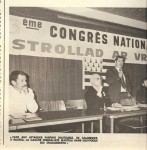 1975: 3rd National Congress of SAV with Yann Fouéré in the center, from the journal ‘Combat Breton’
1975: 3rd National Congress of SAV with Yann Fouéré in the center, from the journal ‘Combat Breton’
After the disappearance of the MOB in the late sixties, Yann Fouéré’s monthly newspaper, l’Avenir de la Bretagne, takes on a new challenge with the formation of the SAV-Strollad Ar Vro political party, evolving from the MOB to address the social and economic development of Brittany. Yann Fouéré is the SAV candidate in Dinan, Côtes d’Armor, in the 1973 legislative elections. Defeat in the elections and numerous threats from the French authorities take their toll on the newspaper which eventually ceases publication.
 In 1967 he is appointed Chevalier de Grâce of the Ordre Souverain de Saint Jean de Jerusalem, Chevaliers Hospitaliers de Malte.
In 1967 he is appointed Chevalier de Grâce of the Ordre Souverain de Saint Jean de Jerusalem, Chevaliers Hospitaliers de Malte.
Towards the end of the sixties, Brittany is affected by several bomb explosions of the FLB, Front de Liberation de la Bretagne,(1). The organization undergoes several changes over the next decade.
(1) Read “FLB-ARB, l’histoire (1966-2005)”, by Lionel Henry and Annick Lagadec, Yorann Embanner, 2006.
Yann Fouéré is regularly suspected of having a role in the activities of the underground movement. He is arrested in October 1975 along with many others and imprisoned in La Santé prison in Paris. He has written of this experience and the months he spent in La Santé in a book published in 1977, “En Prison pour le FLB”(English translation now on this site). Several pressure groups for his release from Breton, Welsh, Irish and International organisations – such as Amnesty International, the European Parliament and those of his family and friends – are brought to bear on the French authorities. After a hundred and five days, he is released on condition that he does not leave the country for a year.
The political situation in France in the post war period and right into the seventies was by no means black and white. A purely factual report about charges and trials brought by the State, such as in the case of Yann Fouere in the seventies, can convey a false impression if it is not put in the context of that period ; i.e., all these proceedings took place under the State Security Court, a Court of exception which was condemned by many human rights organisations such as Amnesty International, as well as criticised by the Council of Europe for being in violation of the European Convention of Human Rights. Hence the reason why Mitterand when he was elected President in 1980 immediately abolished this State Security Court, and formally recognised the right of citizens to appeal to the European Court of Human rights, a right previously denied to them.
Click on the image to enlarge
 1975 Campaign for the release of Yann Fouéré
1975 Campaign for the release of Yann Fouéré
In the general amnesty of 1981, Yann Fouéré is at last free to travel back and forth again between Ireland and Brittany. He forms the Parti pour l’Organisation d’une Bretagne Libre (POBL) along with other Breton militants, with the renewed publication of l’Avenir de la Bretagne as its monthly mouthpiece. This new movement incorporates Yann Fouéré’s European federalist and nationalist Breton ideas within the context of a liberal economy, rejecting right/left divisions for “national freedom” through the election of a regional assembly.
1981 also marks his participation with other members of POBL in the founding of the E.F.A., European Free Alliance. By the early ‘90’s the party has several hundred registered members with seven federations. It attracts numerous national minority group delegations to its congresses, fostering cooperation towards a common goal for Europe, and continues to support the activities of the U.F.C.E.E. and other international minority organizations.
Yann Fouéré is regularly called to attend numerous International Conferences in his capacity as expert on Federalism and Minority groups.
 1982 Conference on ‘ L’Europe des Régions ‘ in Saint Vincent, Vallée d’Aoste, Italy.Yann fouéré on the left with Boris Pabor (Slovenia) and Yvo Peters (Flanders).
1982 Conference on ‘ L’Europe des Régions ‘ in Saint Vincent, Vallée d’Aoste, Italy.Yann fouéré on the left with Boris Pabor (Slovenia) and Yvo Peters (Flanders).
In November 1999 a division in the party reduces membership, but POBL continues as the Mouvement POBL for another 5 years. Finally in 2005, after a quarter of a century, POBL goes into hibernation, concentrating on the continuation of its bi-monthly l’Avenir. Yann Fouéré remains Honorary President of both.
Yann Fouéré’s published works also include the following:
“ Ces Droits que les autres ont… mais que nous n’avons pas” is published in 1979.
“ Les Régions d’Europe en quête d’un Statut” is published in 1982.
“ Problemes Bretons du Temps présent” is published in 1983.
These are followed by the two volumes of his autobiography, “La Patrie Interdite, Histoire d’un Breton” published in 1987 and “ La Maison du Connemara” in 1995.(English translation of both of these are on this site)
“ Europe! Nationalité Bretonne…Citoyen Francais?” is published in 2000.
In 1999, Yann Fouéré creates l’Institut de Documentation Bretonne et Européenne, IDBE, to provide a structure for the preservation of archives relating to Brittany’s history for the use of researchers and historians, and also as a base for the Fondation Yann Fouéré.
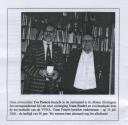 2006 – Yvo Peeters, Vice President of the Flemish National Writers Union (VVNA), presented the Honorary Membership Medal of the Union to Yann Fouéré. The Union only admits 8 Honorary Members. Yann succeeded to the seat of Prof.Guy Héraud who passed away.
2006 – Yvo Peeters, Vice President of the Flemish National Writers Union (VVNA), presented the Honorary Membership Medal of the Union to Yann Fouéré. The Union only admits 8 Honorary Members. Yann succeeded to the seat of Prof.Guy Héraud who passed away.
Deceased on 20th October 2011, at the age of 101 years old, leaving us with these words:-
ADIEU
It is only my body you place in the earth
The echo of my struggles, I leave with you;
For neither exile, prison, fear nor war
Could prevent me, and will not prevent you.

